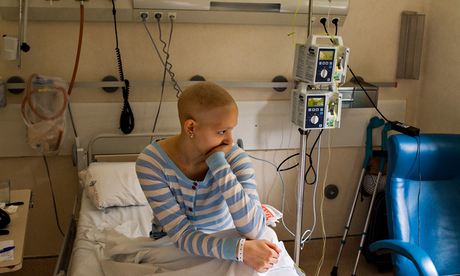
A few months ago, my consultant oncologist sat with me in his room and wrote on the top of a consent form "Palliative chemotherapy with the intent of relieving symptoms". This was my second time facing the chemotherapy wringer for the incurable, rare sarcoma residing in my abdomen, and a huge decision that I had made after much deliberation and discussion.
At 31, death was hurtling towards me at an alarming rate, and although the primary motivation for both my oncologist and me was to relieve the pelvic pain that disturbed my sleep every night, the chemotherapy regimen would also prolong my life.
But what does "palliative" actually mean? In the oncology world, there is a split between curative and palliative treatments. Curative management includes surgery to cut out a cancer or radiotherapy to burn cancer cells; both are performed with the intent of eradicating the cancer.
I see chemotherapy as sitting on the fence between curative and palliative. For some cancers, such as breast, it is often given as a treatment alongside other therapies to increase the chance of cure. For other cancers, including some forms of leukaemia, it can indeed be curative in itself. Then there is the palliative approach, where the primary intent is to relieve symptoms such as pain. However, as chemotherapy effectiveness has advanced over the years the lines between relieving symptoms and prolonging life have become blurred in the palliative situation. When it comes to decision making, this can muddy the waters, as the patient's primary intent may be life prolongation or, in some circumstances, misunderstandings and communication failures may lead to a patient believing their treatment is curative.
I first presented with cancer at the age of 29. It came completely out of the blue and at the time my life was balancing on a knife edge; my kidneys had failed and my body was riddled with infection. The cancer had spread to my lymph nodes, liver and bones and had advanced at such an alarming rate that the main tumour in my tummy had grown all the way from my pelvis up to my belly button. Given the extent of my disease, it was clear that no doctor would ever be able to cure me. I felt, however, that I had little choice but to give palliative chemotherapy a chance, as the alternative of refusing treatment was going to result in a rapid demise, which would have been incredibly difficult for my husband and family.
My initial chemotherapy was remarkably effective and gave me almost two years of good quality life. I had been the patient who exceeded everyone's expectations and lulled those closest to me into a false sense of security. But this efficacy had come at a cost; the treatment was tough to endure, with intractable vomiting, repeated hospitalisation for infections and multiple blood transfusions. I stopped the initial course earlier than planned because my quality of life was suffering so much.
What many people don't realise is that chemotherapy carries a very real risk of death and other significant complications such as heart or kidney failure, not just the well-recognised hair loss, vomiting and infertility. Balancing these serious risks against the potential benefits including life prolongation in the final phase of someone's life must be a near impossible task for an oncologist.
Having only just survived my second battering with chemotherapy and still suffering ongoing consequences, I think the decision to refuse further treatment in future may be easier. However, when someone is offering you more life on a plate it is difficult to refuse. Choosing the more time option does run the risk of ruining the quality of life during any remaining time, and this is an aspect I've had many internal battles with.
I firmly believe there does come a point in a situation like mine where death has to be accepted; where quality is pursued over quantity; where time at home is valued rather than repeated trips to hospital. I've always said I wouldn't want to spend my final days lying in a hospital bed hooked up to a drip filled with poison. I hope I will instinctively know when that point is.

